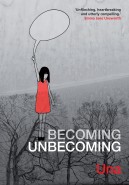
Book Review: Becoming Unbecoming by Una

Becoming Unbecoming
Graphic Novel by Una
Arsenal Pulp Press, September 2015
ISBN-13: 978-1908434692
$24.95; 224pp.
Reviewed by Edmund Zagorin
Becoming Unbecoming is a nonfiction graphic novel that describes the UK-based artist Una’s coming of age during the Yorkshire Ripper’s terror against women. Set in the 1970s and early 1980s, Becoming Unbecoming takes us through Una’s own encounters with sexual violence, survival and feminist inquiry regarding rape culture.
As the Yorkshire police struggle to make headway in discovering the identity of the Ripper, readers begin to wonder how this, like so many other criminal cases, may have gone differently if the victims had been men. With quotes and images taken from countless news articles, Una shows how this hunt to stop a serial rape-murderer instead became a hunt to justify the Ripper’s horrific crimes by publicly questioning why the women were out of their homes in the first place. Rather than following up on explicit physical descriptions and leads provided by one of the Ripper’s surviving victims, police instead chose to focus on gathering evidence that the murdered women were prostitutes or otherwise had “loose morals.” The book’s illustrations juxtapose uncanny symbolism of the silence, rage and depression facing rape survivors against a scorching analysis of global rape culture.
Becoming Unbecoming is a masterful—if profoundly disturbing—book and should be required reading for any high school or collegiate curriculum that deals with consent, femicide or the spectacularized depictions of violence against women in popular culture. Although a graphic novel about rape, Una veers away from graphically depicting any actual rape scenes, rather focusing her abundant talents on elaborating the nightmarish prison of the silence that follows. For example, a woman carrying an empty speech bubble becomes the eerie metonymy for the weight of silence that survivors of sexual violence often carry. Hence, rapes in Becoming Unbecoming are primarily illustrated by their psychological after-effects; eerie blendings of shadow, tree branches and the dense brush of Northern England into Rorschachs of terror. The final panels in the book—of the thirteen women murdered by the Yorkshire Ripper—evoke a haunting gesture of remembrance against the type of forgetting that popular accounts of male serial killers too often facilitate.
In this, Becoming Unbecoming bears similarities to Maggie Nelson’s The Red Parts, a nonfiction chronicle of Nelson’s aunt’s life and rape-murder by a male serial killer of women in Michigan. Like Nelson, Una’s gripping blend of a horrific crime saga and coming-of-age survivor narrative stands as a critique against the vast fanbase that has grown up around many serial killers (including the Ripper), fanbases whose hagiographies attempt to place male sexual violence in the realm of the extraordinary. As Una writes in the book’s afterword, “The idea that there is something embedded deep within the culture that produces eruptions of gendered violence and allows them to flourish, rather than their being random and motiveless, is becoming mainstream, and is what drives this book.” Becoming Unbecoming’s delivers a poignant demonstration of precisely this unbearable everydayness of traumatic sexual violence and points to ideas that can contest its ongoing repetition.
Edmund Zagorin writes prose fiction under the name Elizeya Quate. His first book, The Face of Our Town was released in 2016 from KERNPUNKT Press. @elizeyaquate

Leave a Reply